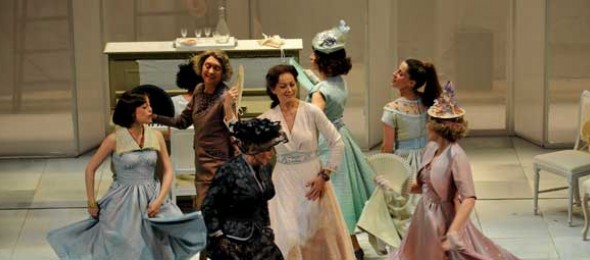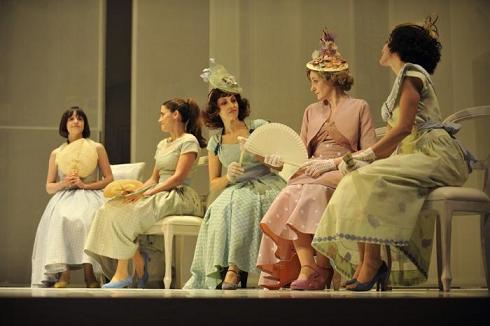(from Judgement )
Nubile Donna Rosita , born from the pen of the English poet, has spent a lifetime waiting for a man who will not return. The dignity and strength of character in its own way epic are enhanced by a wonderful cast, all female. Lluis Pasqual directs

Count the days that pass, slipped away to be weeks and months and years. Almost senz'accorgersene and marvel at the girl tongue that recalls, by chance, the time elapsed since he left. That time scivolatole him as a conviction, the sentence or conditional mercilessly, imprisonment of the soul before the body, conscious and self-inflicted.

lorchiana La Rosita is the heroine of an expected stubborn woman titanic force grappling with the usual, customary, half man. Or rather, with the usual man , which means by nature or vocation, that when love, your love is a simulacrum of the eternal solidity, then allocate to the ongoing obstacle, the sinking so often inglorious. In the case of Rosa, to a life far away, an ocean away, while he repairs the arms of another, in the most common conditions, The Gram epilogue is a joint captivity, when living together becomes a mixture of moods during the day and the night smells evil.
After all, the history of abandonment of Donna Rosita nubile is a topos all too simple: two lovers torn himself from that life, and he goes away, never to return, she awaits tidings Butterfly without horizons of suicide. Garcia Lorca was inspired by the real pain of Aunt Clotilde, defected to his love, which you, your whole life, not to abdicate, opposing harsh indifference to the gaze of the vulgar and insolent Granada bourgeoisie. The result is a fine text and clean, distilled of feelings, situations, and the background environment Hispanic thirties, in a language which does not feel tight and clean the Italian translation.
 Lluís Pasqual, already home to the Piccolo in Milan - which produces construction - drawing a picture of extreme elegance for a broken-hearted comedy where the real issue is time: a theory of sliding panels tones makes candles changing the unitary space, suggestive of bourgeois interior styling. icy scene is the ideal place for the recitation of an exceptional cast, where to become the main protagonist is not the Rosita Andrea Jonasson, but at times the brightness of the beautiful harlequin Giulia Lazzarini , whose ruler is the real engine of internal states. Drama feminine, it was said that the well-dashed Zia Franca Nuti is another good choice, as well as for various spinsters that punctuate the chorus that saw the gradual disintegration of the protagonist's dream of love.
Lluís Pasqual, already home to the Piccolo in Milan - which produces construction - drawing a picture of extreme elegance for a broken-hearted comedy where the real issue is time: a theory of sliding panels tones makes candles changing the unitary space, suggestive of bourgeois interior styling. icy scene is the ideal place for the recitation of an exceptional cast, where to become the main protagonist is not the Rosita Andrea Jonasson, but at times the brightness of the beautiful harlequin Giulia Lazzarini , whose ruler is the real engine of internal states. Drama feminine, it was said that the well-dashed Zia Franca Nuti is another good choice, as well as for various spinsters that punctuate the chorus that saw the gradual disintegration of the protagonist's dream of love. austere staging, balanced, at times majestic: you stand out pastels of womanly manners, nell'intermezzo music that gives the whole a nice chromatic, even before the rhythm. The story unfolds as a razor blade, relentless, all-too-measured every , as if the intention was to play the expansion, the gaps, but risk of penalizing the performance as a whole.
It is the final picture to recover that spirit that seems sore need, emotional shock in a position to deal the coup de grace: Rosita finally dominates the scene that opens toward the audience through a workable lineup, found that far seemed mere affectation of style. The Soltera abandoned in a progression aftertaste Pirandello proves Scientia and tragic heroine, who played the Queen of pain congealed in his dignity, that only a tiny and can be considered conventional wisdom in some ways, laughable. It remains uncertain whether that suffering, that pain that the drip has consumed the soul eroding over the years, really worth worthwhile: after all, still speak of little stuff, or men, avoiding sexism of any kind of wretched, depressing humanity.
January 20, 2011
Reviewed Subject:
Nubile Donna Rosita by Federico Garcia Lorca, directed by Lluis Pasqual
Nubile Donna Rosita by Federico Garcia Lorca, directed by Lluis Pasqual
tour: January 19 to 23, Trieste, Politeama Rossetti, January 26 to 30, Udine, John T. New, 1 to 3 February, Pavia, T. Fraschini, 5 to 6 February, Cremona, Ponchielli
T. The rest of the poster: Elena Clementelli, translation; Ezio Frigerio, scenes, Franca Squarciapino, costumes, Claudio De Pace, lights, Josep Maria Arrizabalaga, music, Montserrat Pujol Colomé, choreographed movements, with (in alphabetical order) Andrew Coppone, Gian Carlo Dettori, Pasquale Di Filippo, Martina Galletta, Alessandra Gigli, Eleonora Giovanardi, Rosalina Blacks, Stella Piccioni, Franco Sangermano, Sara Zoia.
Production: Piccolo Teatro di Milano - Teatro d'Europa
The Guest of Stone: George Streheler because the show combines three generations of actors and not only, or directly related to Small or to its main author
rating: the level of the performers deserve (at least) three suns, the elegance idem. The pace of the show, however, fails to convince entirely
T. The rest of the poster: Elena Clementelli, translation; Ezio Frigerio, scenes, Franca Squarciapino, costumes, Claudio De Pace, lights, Josep Maria Arrizabalaga, music, Montserrat Pujol Colomé, choreographed movements, with (in alphabetical order) Andrew Coppone, Gian Carlo Dettori, Pasquale Di Filippo, Martina Galletta, Alessandra Gigli, Eleonora Giovanardi, Rosalina Blacks, Stella Piccioni, Franco Sangermano, Sara Zoia.
Production: Piccolo Teatro di Milano - Teatro d'Europa
The Guest of Stone: George Streheler because the show combines three generations of actors and not only, or directly related to Small or to its main author
rating: the level of the performers deserve (at least) three suns, the elegance idem. The pace of the show, however, fails to convince entirely
rating: 
0 comments:
Post a Comment